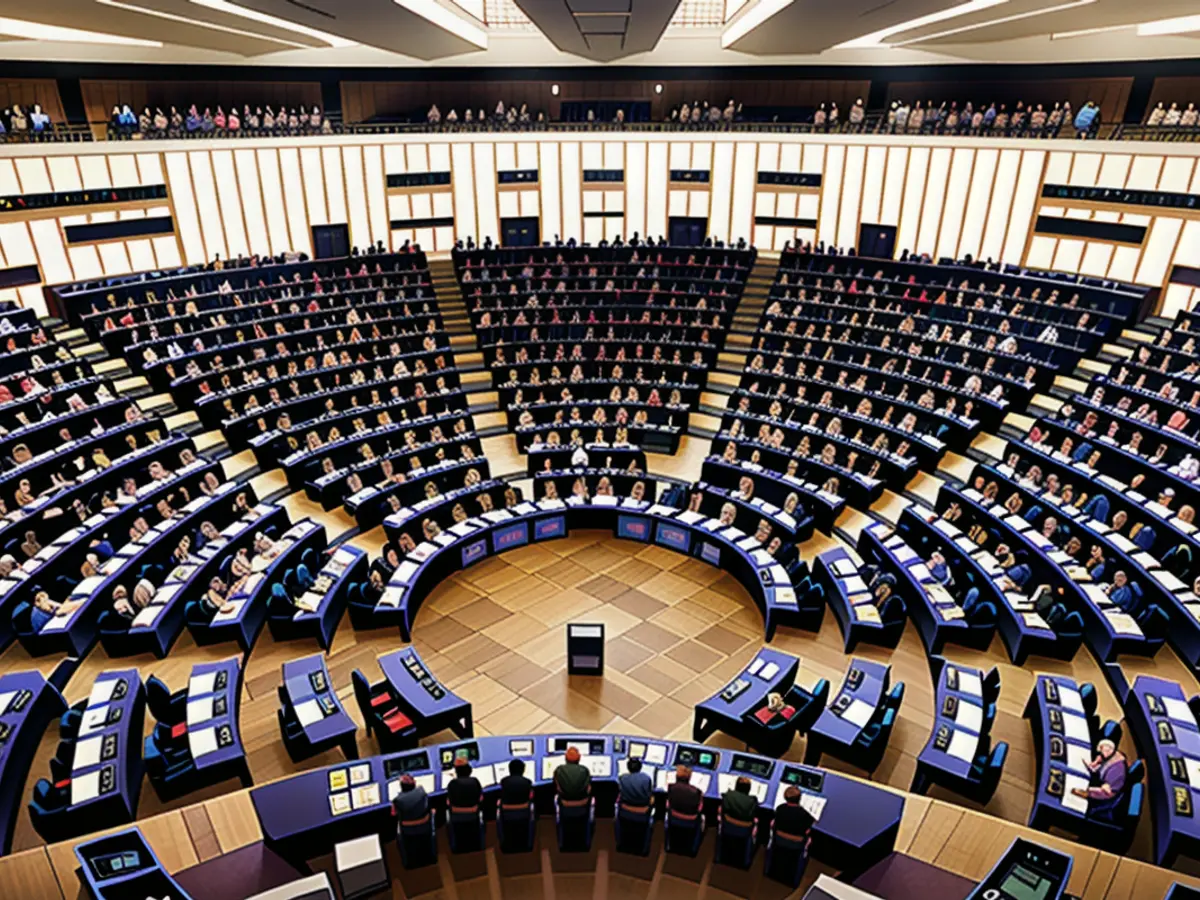Upcoming European Elections: 2024 - In the upcoming years, EU will focus on addressing climate issues, weaponry development, and reforms.
Europe aims to achieve climate neutrality by 2050, with Commission President Ursula von der Leyen initially pledging a massive investment in environmental protection. However, her EPP faction has become more hesitant about the green agenda. The formation of an Energy Union is crucial to ensuring a sustainable and secure energy supply at affordable prices, with a strategy outlined in 2015. The 2022 Russian invasion of Ukraine renewed interest in this goal and accelerated the push for energy security. To compete with the USA and China in green technologies, the EU plans to strengthen its internal market. In 2023, former Italian Prime Minister Enrico Letta put forth proposals at a summit, and 27 heads of state agreed on reforms in nine areas, including better opportunities for EU-wide investments in shares and simpler cross-border savings options for small investors. To foster a more competitive defense industry, the EU should develop new technologies, modernize existing equipment, and create a European Defense Fund. A long-term budget plan with a multi-annual financial framework (MFF) and long-term budget perspective (LTBP) is necessary for financial stability and predictability. Internal reforms are also imperative to improve the efficiency of EU institutions and streamline decision-making processes.
The EU requires around 650 billion euros annually by 2030 from private funds for the transition from fossil fuels to renewable energy sources and digitalization, according to Letta. One potential solution to financing this transition is the creation of a meaningful Capital Market Union, which may involve integrating European capital markets, as many countries have divergent laws. While France favors a small group of EU countries to spearhead the process, Germany supports a broader approach with all EU nations. At the 2023 European summit, leaders endorsed the idea of a Capital Market Union but faced resistance from smaller countries on matters like a European financial supervisory authority or harmonized corporate taxation. A Capital Market Union is paramount to mobilizing private funds for investments, noted German Chancellor Olaf Scholz last month, who intends to present reform ideas with French President Emmanuel Macron.
Goal of Climate Neutrality
The EU aspires to become climate-neutral by 2050, where emissions remain balanced by carbon offsets. Current President Ursula von der Leyen, who assumed office in 2019, called for this transformation and invested heavily in environmental preservation. Nonetheless, other parties in her European People's Party (EPP) faction have become increasingly skeptical about the initiative due to the lead-up to the annual election and recent farmer protests. EPP leader Manfred Weber commented that the green initiative would undergo a thorough evaluation after the European vote. Despite the growing reservations, the EU's goal of climate neutrality remains unchanged.
Energy Union
The EU's energy transition should be bolstered through the establishment of an Energy Union to provide a steady and secure energy supply at affordable rates for Europeans. A blueprint for this union was proposed in 2015 by the EU Commission, encompassing supply security, decarbonization, and an integrated internal energy market. The 2022 invasion of Ukraine by Russia triggered a major energy crisis in Europe and reignited the push for improved energy security.
Strengthening Competitiveness Globally
To compete with the United States and China in the realm of green technologies and artificial intelligence (AI), the EU must fortify its internal market. Enrico Letta, the former Italian Prime Minister, introduced plans for this at a meeting in April. The 27 European leaders concurred on reforms in nine categories, including drastic enhancements to EU-wide investments in stock markets and the creation of convenient cross-border savings products for small investors.
Capital Market Union
The EU is seeking to create a single market for capital. By fostering this, European companies would find it easier to raise funds and increase investments in the union, leading to job creation and economic stimulation. Letta estimated that the EU would need 650 billion euros annually by 2030 from private funds to facilitate the switch from fossil fuels to renewable energy sources and digitalization. An integrated Capital Market Union could be the key to financing. One of the current challenges facing this goal is the fragmented nature of financial markets across Europe, prompting lengthy discussions over how to unite them.
Internal Reforms
To evolve into a more efficient and effective organization, the EU must undergo internal reforms, such as amending the European institutions' operations, simplifying decision-making procedures, and fortifying the rule of law. This also entails enhancing the EU's democratic legitimacy and transparency.
The specifics of funding these reforms remain undefined. Letta predicted that the EU would require an annual 650 billion euros from 2030 to execute their transition to renewable energies and digitization. A unified Capital Market Union might hold the key to obtaining these funds. Letta emphasized that a Capital Market Union must be made a priority to attract more private capital to investments. Scholz and Macron plan to present reform recommendations jointly.
Capital Market Union
The ambitious undertaking of a Capital Market Union aims to supply the finance needed to accomplish the desired outcomes. More united European financial markets could eliminate the competitive disadvantage Europe experiences when compared to the USA or Asia due to varying national laws regarding insolvencies, taxation of capital gains, or stock exchanges. Despite widespread support for this concept at the 2023 European summit, several smaller nations voiced concerns about a pan-European financial supervisory authority and the harmonization of corporate taxation. A Capital Market Union is central to attracting more private capital to investments, as stated by Scholz recently. Together with French President Emmanuel Macron, Scholz will present reform ideas.
The present EU Commission wants to set up a massive €1.5 billion program for the European defense industry. This billion-dollar scheme is slated for implementation from 2025 to 2027, with funding expected to come from the EU's budget. In mid-March, the Commission made this declaration public. Additionally, it urges EU nations to acquire at least 40% of their military equipment jointly by 2030. Furthermore, some of the funds from frozen Russian assets should be allocated to buy weapons for Ukraine. If re-elected, European Commission President Ursula von der Leyen intends to establish a new position, that of a Defense Commissioner. Nonetheless, German government spokesman Steffen Hebestreit voiced a degree of scepticism regarding these plans from his government.
Budgeting for the Long-Run
The European Union and its member nations will come together to determine the financial plan for the period spanning 2028 to 2034. Currently, this amounts to €1.1 trillion. Analysts anticipate changes in the budget and possibly an increase in funds. These changes can be attributed to altering expenditure priorities and potential expansion of the EU in the coming years through the accession of countries like Montenegro or North Macedonia.
High-ranking officials from the EU and some heads of state are advocating for structural reforms before admitting larger nations, like Ukraine, into the bloc. Parliaments will significantly impact the shaping of such reforms over the next five years. Key areas of focus include changes to the common agricultural policy and alignment of living standards across the various member states. Chancellor Scholz shares these sentiments, with a special emphasis on abolishing the unanimity principle in areas like foreign and security policy. This would stymie nations from obstructing or postponing significant decisions.

Read also:
- Enrico Letta, the former Italian Prime Minister, emphasized the need for a Capital Market Union to finance the EU's transition to renewable energy sources and digitalization.
- Ursula von der Leyen, the President of the EU Commission, pledged a massive investment in environmental protection in her pursuit of climate neutrality by 2050.
- The EU aims to compete with the USA and China in green technologies and artificial intelligence by strengthening its internal market, as proposed by Enrico Letta.
- Manfred Weber, the leader of the EPP faction, indicated that the green agenda would undergo evaluation after the European elections.
- The EU requires around 650 billion euros annually by 2030 from private funds for the transition from fossil fuels to renewable energy sources, according to Letta.
- Germany supports a broader approach to a Capital Market Union, involving all EU nations, contrary to France's preference for a small group of countries to spearhead the process.
- Ursula von der Leyen's EPP faction has become more hesitant about the green agenda due to the lead-up to the European elections and recent farmer protests.
- To foster a more competitive defense industry, the EU should develop new technologies, modernize existing equipment, and create a European Defense Fund, as suggested to foster a stronger defense sector.








